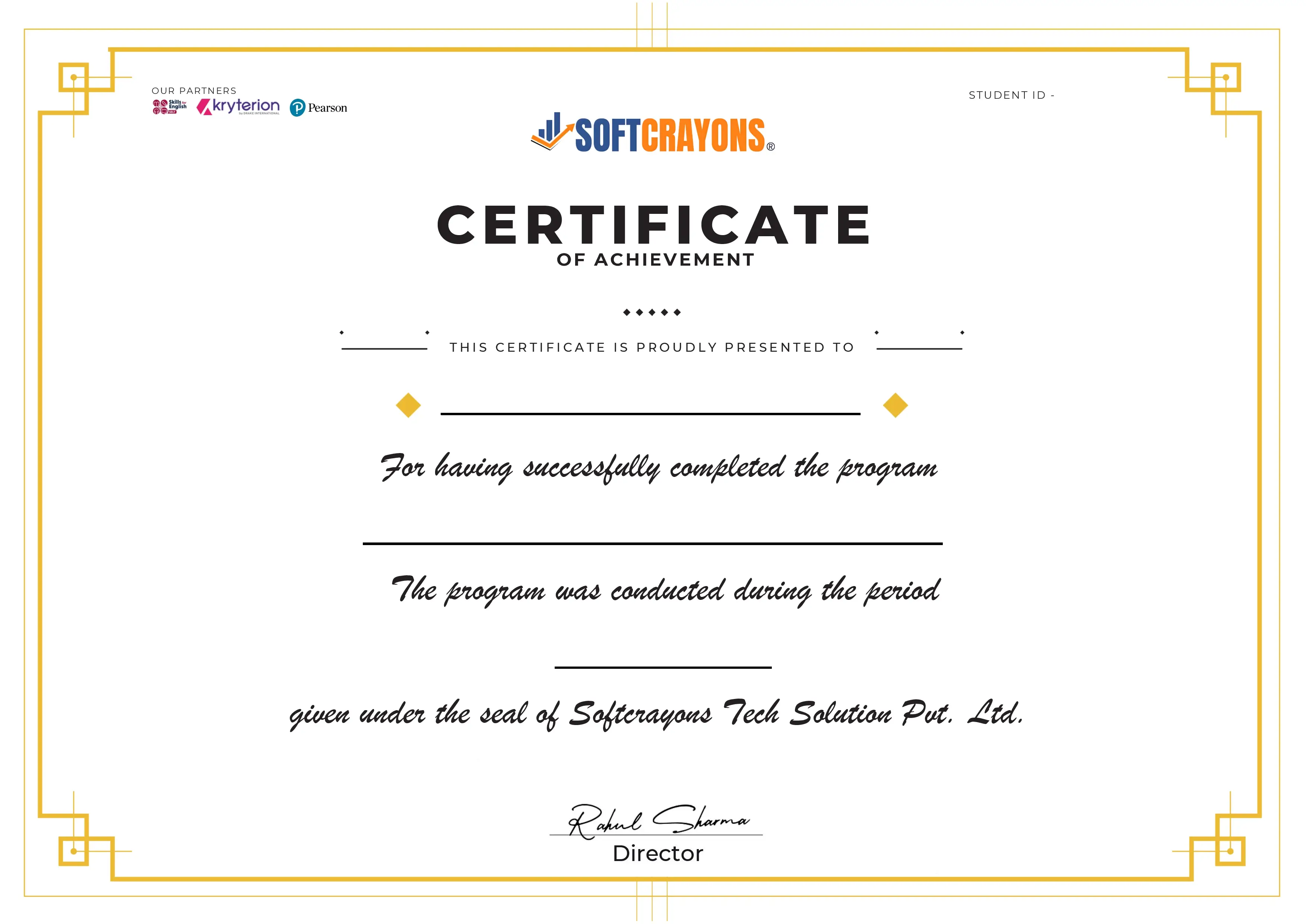Data Structures & Algorithms using JAVA
"Innovate. Integrate. Inspire The Future with SoftCrayons"
Softcryons is one of the best institutes to learn about Data Structures and Algorithms using Java. Students say that Softcrayons is the best place to learn about technology. It has the best online and in-person classes that are right for the current job market. Our well-organized curriculum and experienced teachers make sure that you learn the most important DSA principles by using Java to solve real-world problems and do hands-on work. Softcrayons is the best choice for anyone who wants to become a Java developer because it focuses on building real-world applications and offers 100% job placement. To help you move up in your career, join Softcrayons for the best training in Data Structures and Algorithms.
Learn, Build Skills, Grow Limitlessly. Your IT Career Starts Here.

Course Duration
4 - 6 Months

New Batch
As per schedule hybrid mode

Payment
Flexible One-Time/Installment

Mode
Flexible Offline/Online
Professional Skill Development
Service Details
Best Institute for Data Structures & Algorithms using JAVA
Softcrayons is the best institute to learn Java Full Stack with DSA. They provide the best classes both online and in person. The purpose of our Data Structures & Algorithms using JAVA is to help you become a better programmer and learn how to create whole web apps and website from the front end to the back end. Softcrayons makes sure you get real-world experience by having skilled trainers, hands-on projects and coding laboratories. We also provide 100% placement so you'll be ready to work after you finish the course. Join Softcrayons, the best place to learn Data Structures & Algorithms using JAVA and begin your path to a successful career in software development.
Overview of the course:
The DSA using Java Course from Softcrayons covers important topics like arrays, linked lists, stacks, queues, trees, graphs, sorting and searching algorithms. The program is carefully planned to combine learning with doing, giving students hands-on experience through coding exercises and real-world projects.
What Will You Learn?
- Core Java, Advanced Java, Spring Framework and Hibernate are all tools for developing back-end systems.
- Data Structures and Algorithms (DSA): You need to have a deep understanding of DSA concepts to solve hard problems quickly.
- Git and GitHub are two examples of systems that keep track of different versions.
- Developing soft skills means working together, solving problems and talking to people.
The goal of the course is: -
The main thing we want to do is:
- Make sure you have a strong foundation for data structures and algorithms.
- Get better at solving problems and thinking critically.
- Get students ready for technical interviews and programming contests.
- Make sure you know Java well before trying to write hard algorithms.
What new hires should expect to make?
People who finish our DSA with Java Course\can expect to make good money. Freshers usually make between INR 4 and 6 lakhs a year, but they can make more depending on their performance and the company that hires them.
After the training what will you get?
- Creating and putting into action effective algorithms.
- Improving performance by optimizing existing code.
- Working with teams from different departments to solve hard problems.
- Taking part in code reviews while making sure the code is of high quality.
Training Certificate:
After finishing the course students get a special certificate that shows they are good at using Java to work with Data Structures and Algorithms. Most big companies recognize this accreditation and it adds a lot of value to a candidate's CV. Softcrayons is known for offering the best Data Structures and Algorithms (DSA) using JAVA Training.
Mock Interview:
Softcrayons gives our students detailed mock interviews to make sure they are ready for the job market. These classes are like real interviews which gives you useful feedback and boosts your confidence.
Why Choose Softcrayons?
- Industry Expert Trainers
Learn from professionals with 15+ years of real-world Data Structures & Algorithms using JAVA experience working with top brands.
- Learning with an expert in a classroom or online
You can learn directly from experts in the field by taking interactive classes in person or online from home or work.
- Doubt sessions whenever you want
Did you miss a class or want to go over what you learned? You can listen to recorded sessions at any time and from any place and you can go at your own pace.
- Getting ready for a job interview
We provide free mock interview sessions. Take free classes to help you get ready for an interview to boost your confidence and your chances of getting the job.
- Unlimited classes to clear doubts
You can get extra help with your learning by going to daily doubt-solving sessions and getting unlimited backup lessons for free.
- 100% Placement Assistance
We provide complete placement support, including job referrals, interview preparation and career guidance to help you get placed.
Related Courses...
Training Features
Live Interactive Classes
Real-time doubt clearing with expert instructors
Hands-on Projects
Build portfolio with industry-standard projects
Industry Curriculum
Updated syllabus matching current job requirements
Latest Technologies
Learn cutting-edge tools and frameworks
Online & Offline
Flexible learning modes to suit your schedule
Certification Support
Prepare for global IT certifications
LEARNING PATH
Master the Syllabus
Program Highlights

Top Faculty with Certification Facility
Learn from the best, as we impart world-class education with faculty who have rich academic & industry experience

Career Service: Job Readiness
Pursuing your desire to being job-ready through resume building sessions & MasterClass for interview preparation

Choose the way you want to learn
Enhance your learning potential by your choice of printed books, audio books, e-books, videos, and live classrooms

Placement Guarantee
Benefit from our network of over 500+ hiring partners from diverse domains to ensure a smooth job transition after 1 year
Common Questions
Upon successful completion of the Data Structure & Algorithm using Java course, your certificate will be issued digitally by Softcrayons. You can download it from your student dashboard or receive it via email.
This course by Softcrayons offers in-depth theoretical knowledge along with practical implementation of data structures and algorithms using Java, equipping you for software development, coding interviews, and top tech roles.
Don’t worry! Softcrayons provides access to recorded sessions for all live classes. You can revisit them anytime. You may also join another batch or contact support for additional help.
You will be eligible for roles like Java Developer, Software Engineer, Backend Developer, and Data Structure & Algorithm Expert. This course strengthens your problem-solving skills for top tech interviews.
Yes, Softcrayons offers a transparent 7-day refund policy from the date of enrollment. If you're not satisfied, you may request a refund as per the terms and conditions.
Yes, Softcrayons provides a batch deferral facility. You can defer your batch to a future date based on availability and prior notification.
Basic understanding of Java is recommended. However, this course is structured to support learners at all levels with step-by-step guidance and real-world examples.
You'll work on hands-on projects such as building a mini compiler, implementing search/sort algorithms, data structure visualizers, and solving real-world coding challenges using Java.
Absolutely! This course is ideal for coding interview prep with a strong focus on problem-solving, time complexity, and real-world scenarios commonly asked in FAANG and other top companies.
Softcrayons stands out with industry-aligned curriculum, experienced trainers, personalized support, practical projects, and 100% placement assistance, making it the best institute for learning Data Structures & Algorithms using Java.
Join Our Data Structures & Algorithms using JAVA
Guranteed Job Placement Program
- Expert-led training
- Hands-on projects
- Globally recognized certification
Training Certification
🎓 Earn Your Certificate
Successfully complete the training and assessments to receive your official certification. This credential validates your skills and enhances your career opportunities.
Showcase your achievements and share your milestones with your network to inspire others and grow your professional connections.

Interested in this Program? Secure your spot now!
Upcoming Batches
Data Structures & Algorithms using Java - Weekend Batch Induction
Data Structures & Algorithms using Java - Weekday Batch Induction
Interested in this Program? Secure your spot now!
What People Say About Us
Himanshu Tyagi
I have completed the course in 3-4 months of DIGITAL MARKETING training under the guidance of Experts Trainers. It was the best experience to learn under them and their teaching methods are out of the box. Best institute for professional courses and a great place. and very cooperative company with helpful staff.
Related Courses


